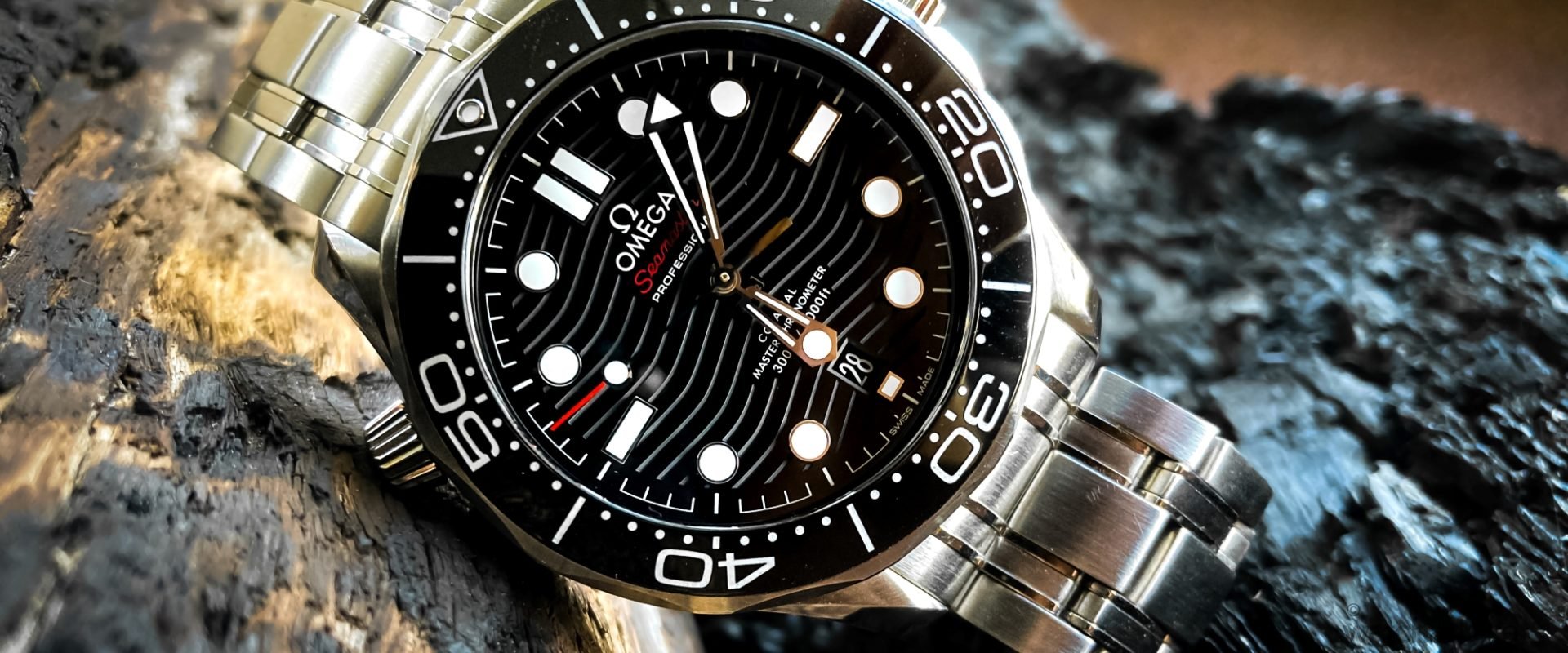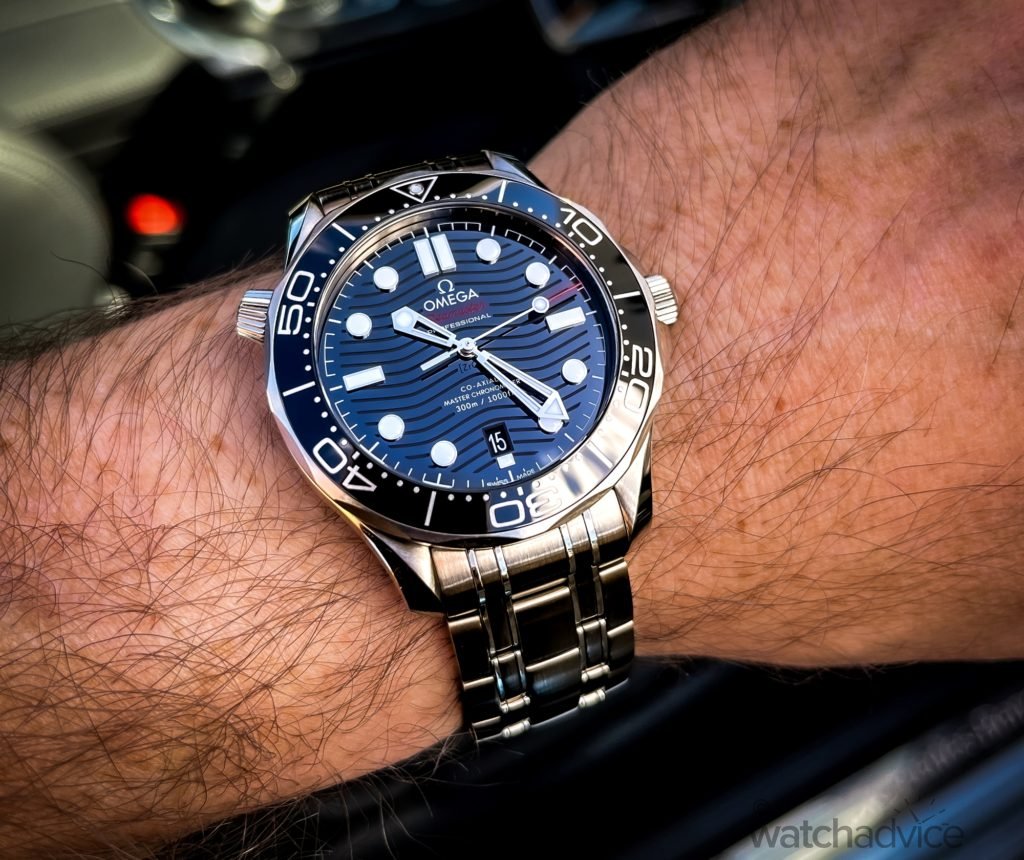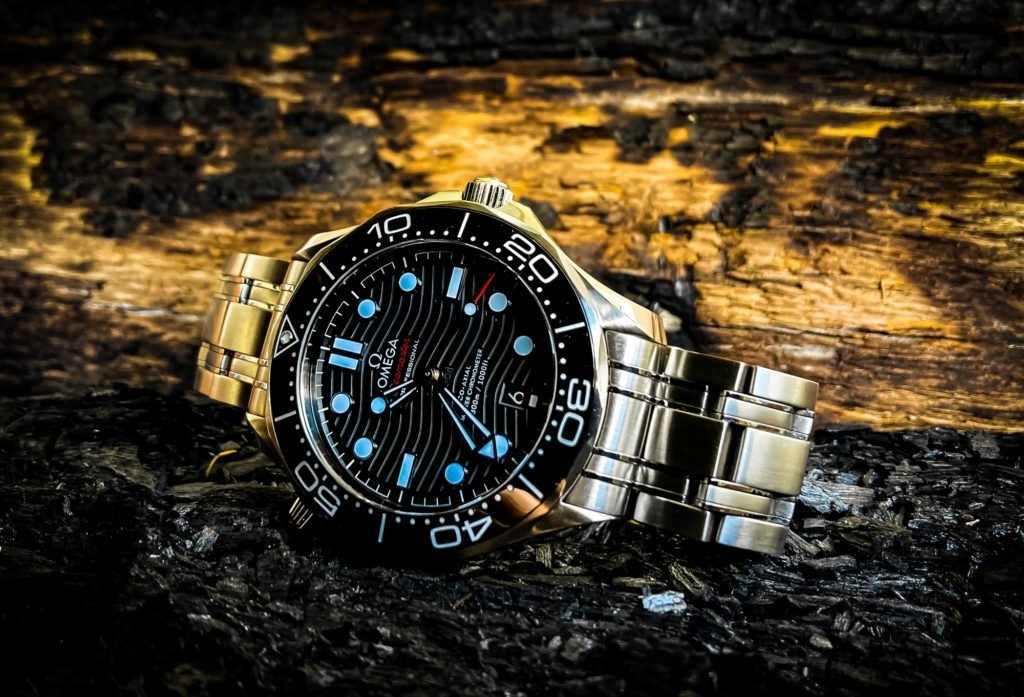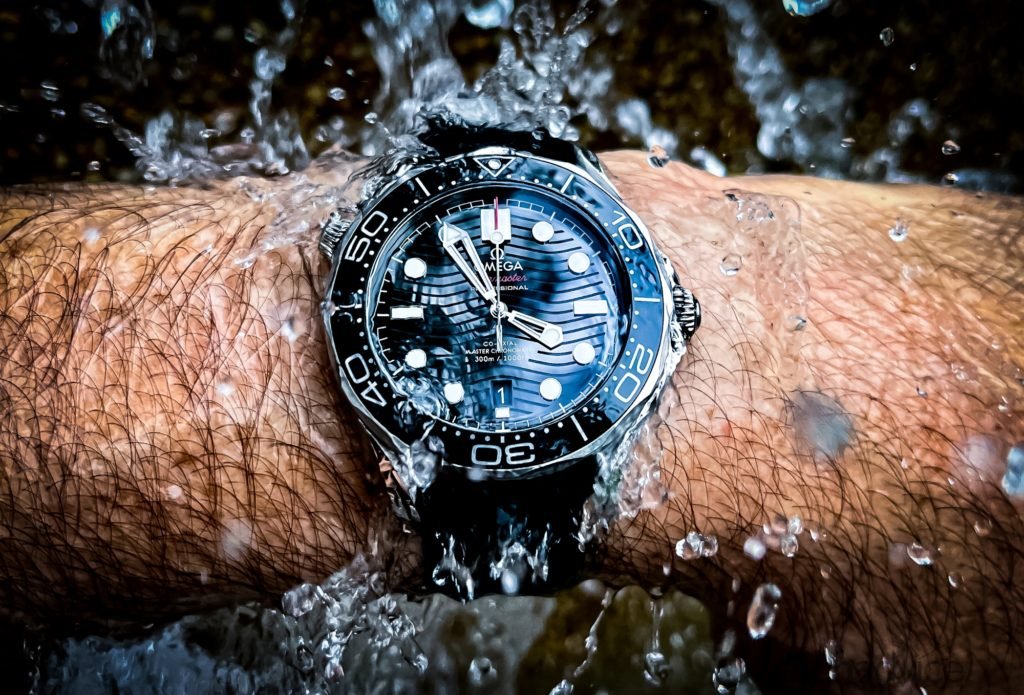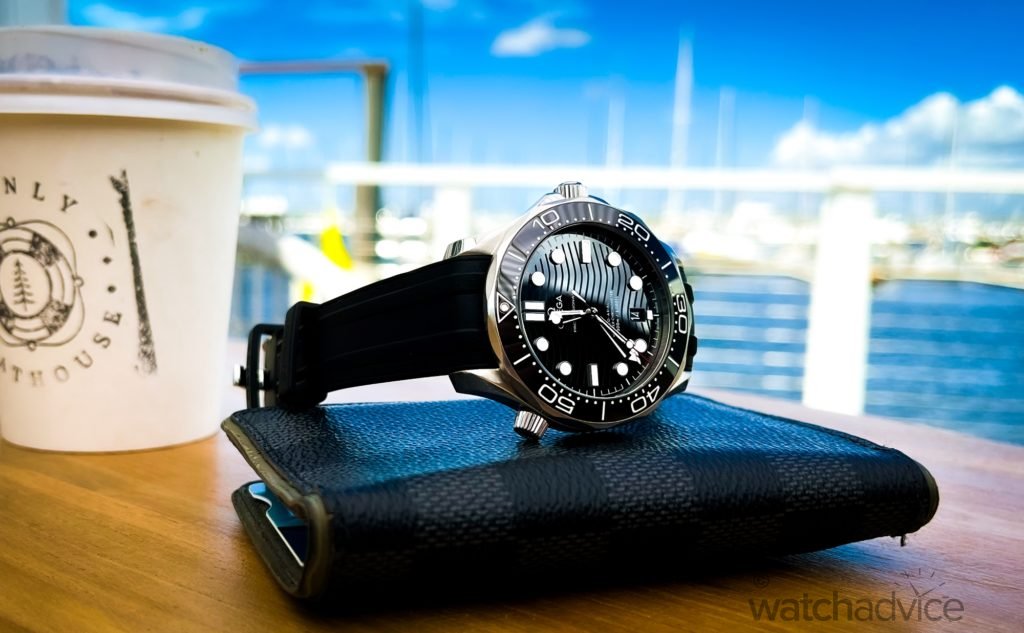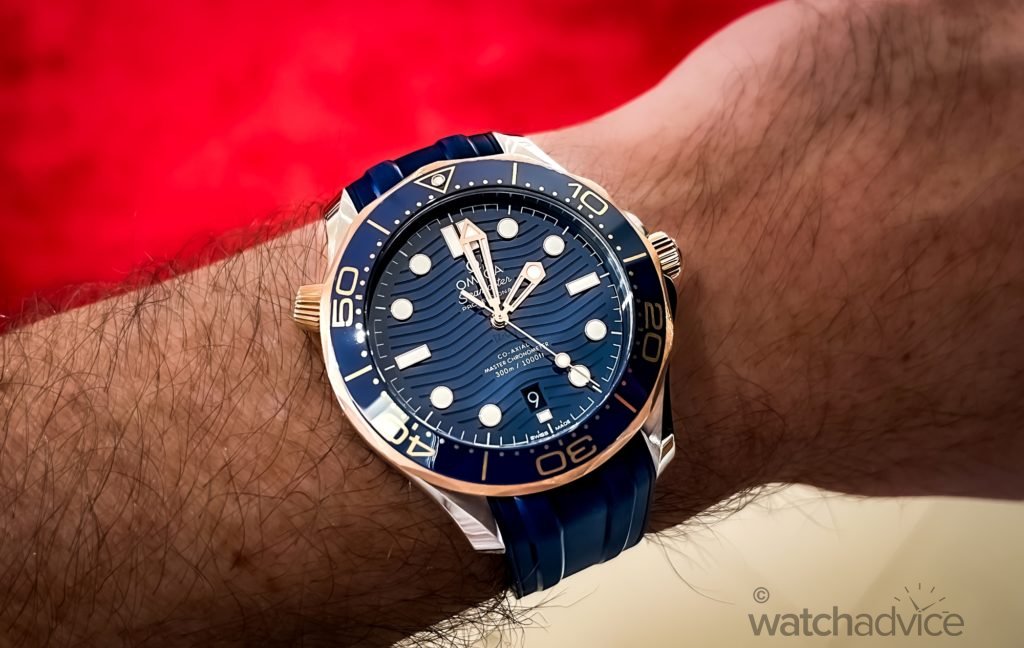There are several watches that most watch enthusiasts should own in their collection at one time. The Omega Seamaster Professional Diver is one of those watches. If it’s good enough for James Bond, then it’s good enough for me!
This isn’t the first time that I’ve owned a Seamaster. I had a 2005 quartz version almost 20 years ago. At that point I’d only owned a Tissot PRS 200 as a “good” Swiss watch. As a fan of James Bond, (and what young male isn’t?), I always wanted his watch. I mean how cool was the wave dial, the deep blue bezel and at the time, that unmistakable bracelet. It looked great in the office and on weekends at the beach. I loved it. Financial issues meant I had to sell it about 7 months after buying it, and that hurt.
About 15 years and many watches later, I decided it was time to purchase another, this time the latest iteration of the SMP 300. I chose the black polished ceramic dial with the laser etched waves, date at 6 O’clock, glossy, almost silky polished ceramic bezel with white inset dive indicators. And this time, on the steel and opting to add the rubber strap too. Very versatile and with the steel bracelet and rubber strap, two very different looks for different occasions.
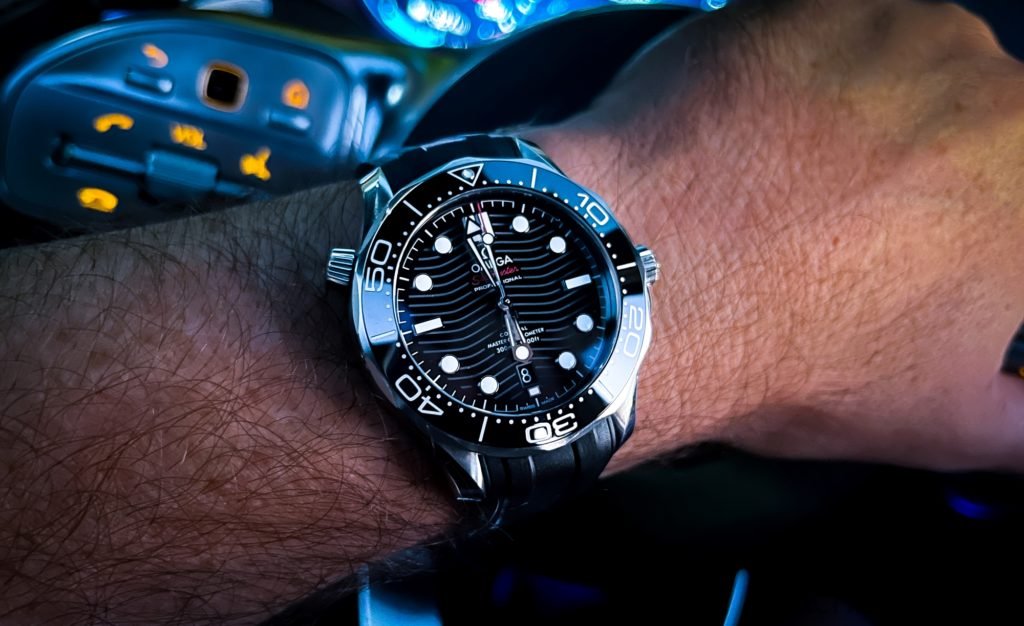
In 2018, Omega launched their updated version of the classic Bond watch. This time in a 42 mm case, making it a little bigger and bolder, and after a slight hiatus, bringing back the wave pattern on the dial. The new wave pattern is laser etched into that beautiful polished ceramic dial, with the Zr02 showcasing as such, and a more pronounced, bigger wave compared to the older models. You can now see the older style wave dial on the latest 60th anniversary Bond watch, albeit, with new materials and technology enhancing the classic look.
As some of you may have picked up, I’m not one for leaving my watches in a box, or safe. I wear them, and everywhere. I believe a tool watch is just that, designed for both form and function, and to take whatever life dishes out. I do believe in style and looks too, which is why I will gravitate towards certain brands and models over others. The Omega Seamaster is both functional as a dive watch, and looks good on the wrist, and depending on what strap or bracelet you have on it, it can change the look a lot!
I probably spend half the time with the steel, half with the rubber strap. The steel bracelet, although classic, hasn’t really changed its design aesthetics since the mid 90s, however, the manufacturing has changed a lot. The bracelet is solid, and I mean solid! The one criticism over the new bracelet for the Speedmaster is that it’s too flimsy, and doesn’t feel robust enough. Not so for the Seamaster Professional Diver. The latest model also has has the sliding micro adjust clasp. This is possibly the best feature of the steel bracelet. Just undo the clasp, and push the slider in and out whilst still on the wrist.
Whilst some won’t agree, it is much easier than Rolex’s glidelock clasp. No need to take it off the wrist, and you don’t need to get the position of the adjustment exactly right, just push the button in and slide. The one drawback of this is the size of the clasp, it’s bulky and raised on the wrist, and doesn’t sit flush with the rest of the bracelet, lending itself to being caught on things. This is where Rolex’s clasp wins I feel, they’re more compact and sit flush with the rest of the bracelet. Outside this, it does wear comfortable though.
In Summer, or the warmer months, the rubber strap comes into its own. Whilst Omega are yet to add a quick change mechanism to their watches, you do need a little patience and practice to swap out the steel bracelet for the rubber, and a good spring bar tool will go along way with this. The bracelet and strap are both moulded to the case shape, so the spring bar does need to be removed carefully to slot the bracelet off, and the strap on. Not an issue really if you aren’t going to do this often.
On the rubber, the watch wears very well. The rubber is a softer style, as opposed to those stiff cheaper straps, and once on the watch and on the wrist, you can justify the $450 RRP that Omega charges for the strap and pin buckle that goes with it. If you want a deployment clasp instead, then get ready to hand over $750.
As the strap is deigned to curve and sit into the lugs and curved against the case, the watch actually wears smaller compared to the steel bracelet. The tapper is pronounced, and wraps and hugs the wrist nicely. The double strap minders hold it in place with the added safety of a small rubber “pin” that locks it in place via the left over buckle holes. Plus it looks damn good on the black strap, perfectly complementing the dial and bezel.
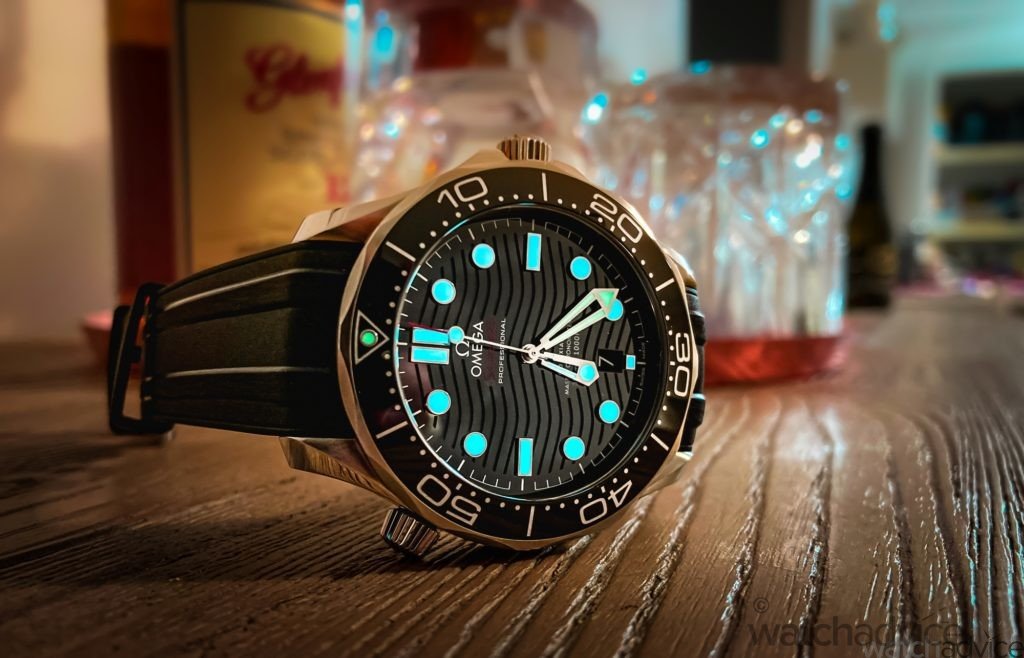
As mentioned previously, the new Seamaster uses the combination of polished ceramic for the dial and bezel, giving the watch an almost liquid effect. The wave motif across the dial is a great touch, harking back to the original Bond Seamaster of 1995, just with a much more modern take, and the classic Seamaster writing in red at the top of the dial. Whilst beautiful to look at, it’s hard to photograph, due to the light reflection on the ceramic, but get the lighting right, and it just looks magnificent. Due to the nature of the material used, it does look different in different light, from almost a grey-ish silver to a deep black. This is a common occurrence on most of the new Seamasters, but I feel this is what makes them that little bit special.
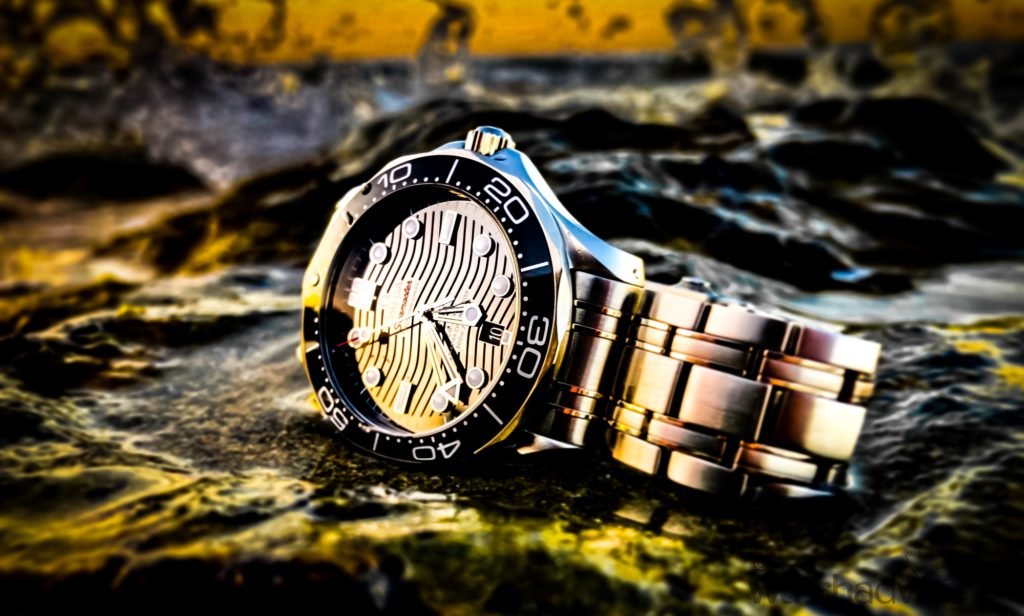
Omega has equipped the new diver with its calibre 8800 movement, which is METAS certified, meaning it is a Master Chronometer, adjusted through 8 tests over 10 days, ensuring an accuracy of -0/+6 seconds a day. Omega also allows you log in and register your watch, seeing the tests done, dates and the results for each, and the tolerances recorded. My experience owning it however was that it ran at maybe 1-2 seconds a day fast, picking up only about 20 seconds over a few weeks, and I really only needed to adjust the time to test it, or when changing time zones.
Overall the wearing experience is great. It wears well and comfortable on both steel and rubber, and whilst the clasp on steel isn’t the smallest, you get used to it. It’s a good looking watch, being versatile for different occasions and can be dressed up or down. It was one of he very few watches that I’ve owned that I couldn’t really fault. Now full disclosure, I parted ways with the Omega a short while ago, making way for others in the collection, however, I do regret letting it go. Would I buy another? Yes. But next, my eye is on the blue and Sedna gold version, with the blue rubber strap. For some reason, I can’t go past this one, and will be added to the collection in the not to distant future. Hopefully…
Reference: 210.30.42.20.01.001 (Steel on Steel) / 210.32.42.20.01.001 (Steel on rubber)
Specification
- Case: 42mm, 13.6mm thick
- Case Material: Steel, with a combination of brushed and polished finishing
- Dial: Polished ceramic with laser engraved wave pattern
- Crystal: Domed scratch‑resistant sapphire crystal with anti‑reflective treatment on both sides
- Water resistance: 300m (30BAR)
- Movement: Calibre 8880, METAS certified and anti-magnetic up to 15,000 gauss
- Power reserve: 55 hours
- Bracelet/Strap: Stainless steel, with polish inner links. Black rubber available (ref:210.32.42.20.01.001)


